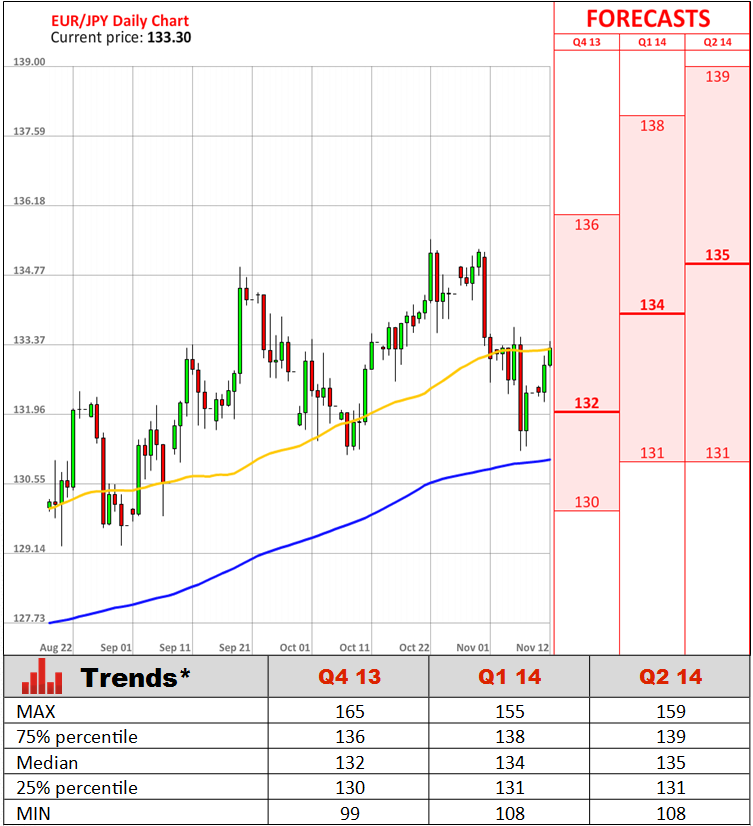The world's third largest economy logged bigger than expected current account surplus in September, on the back of strong income from investments made abroad, though, this optimistic data may mask the underlying problem of structural trade deficits. Official report showed current account surplus measured on the annual basis, soared 14.3% to 587 billion yen, beating average estimate of 401 billion. The main contributor to growth came from income from investments abroad, with surplus standing at 1.63 trillion yen, rebounding from 1.25 trillion in August. When being seasonally adjusted, the surplus plunged to a 125.2 billion deficit, hitting a record low for data stretching back to 1996. It represents the drag on domestic economy from trade deficits exacerbated by higher energy costs and significant drop in the Yen. Weaker Yen has prompted some Japanese businesses to repatriate reserved profits at foreign subsidiaries back to the country. Hence, such transactions have lifted Japanese income balance. However, these are only one-off improvements and they are not likely to repair the trade itself. Although, the Yen has dropped significantly, export volumes still remain subdued. Furthermore, despite obvious improvements in the economy, a gauge of current conditions fell to 51.8 from 52.8, suggesting businesses do not see Abenomics are working as planned, adding more pressure on the government to boost growth and implement structural reforms that are necessary to achieve a sustained growth.
Note: This section contains information in English only.
The world's third largest economy logged bigger than expected current account surplus in September, on the back of strong income from investments made abroad, though, this optimistic data may mask the underlying problem of structural trade deficits. Official report showed current account surplus measured on the annual basis, soared 14.3% to 587 billion yen, beating average estimate of 401 billion. The main contributor to growth came from income from investments abroad, with surplus standing at 1.63 trillion yen, rebounding from 1.25 trillion in August. When being seasonally adjusted, the surplus plunged to a 125.2 billion deficit, hitting a record low for data stretching back to 1996. It represents the drag on domestic economy from trade deficits exacerbated by higher energy costs and significant drop in the Yen. Weaker Yen has prompted some Japanese businesses to repatriate reserved profits at foreign subsidiaries back to the country. Hence, such transactions have lifted Japanese income balance. However, these are only one-off improvements and they are not likely to repair the trade itself. Although, the Yen has dropped significantly, export volumes still remain subdued. Furthermore, despite obvious improvements in the economy, a gauge of current conditions fell to 51.8 from 52.8, suggesting businesses do not see Abenomics are working as planned, adding more pressure on the government to boost growth and implement structural reforms that are necessary to achieve a sustained growth.

Tue, 12 Nov 2013 07:28:03 GMT
Source: Dukascopy Bank SA
"The current account will probably remain in surplus as a robust income surplus will make up for the trade deficits"
- Masamichi Adachi, a senior economist at JPMorgan Chase & Co.
The world's third largest economy logged bigger than expected current account surplus in September, on the back of strong income from investments made abroad, though, this optimistic data may mask the underlying problem of structural trade deficits. Official report showed current account surplus measured on the annual basis, soared 14.3% to 587 billion yen, beating average estimate of 401 billion. The main contributor to growth came from income from investments abroad, with surplus standing at 1.63 trillion yen, rebounding from 1.25 trillion in August. When being seasonally adjusted, the surplus plunged to a 125.2 billion deficit, hitting a record low for data stretching back to 1996. It represents the drag on domestic economy from trade deficits exacerbated by higher energy costs and significant drop in the Yen. Weaker Yen has prompted some Japanese businesses to repatriate reserved profits at foreign subsidiaries back to the country. Hence, such transactions have lifted Japanese income balance. However, these are only one-off improvements and they are not likely to repair the trade itself. Although, the Yen has dropped significantly, export volumes still remain subdued. Furthermore, despite obvious improvements in the economy, a gauge of current conditions fell to 51.8 from 52.8, suggesting businesses do not see Abenomics are working as planned, adding more pressure on the government to boost growth and implement structural reforms that are necessary to achieve a sustained growth.
© Dukascopy Bank SA
Actual Topics
Subscribe to "Fundamental Analysis" feed
Subscribe
Per scoprire di più sulla piattaforma di Dukascopy Bank per Forex/CFD, sul SWFX ed altre informazioni relative al trading,
la preghiamo di contattarci o richiedere di essere contattato (callback request)
la preghiamo di contattarci o richiedere di essere contattato (callback request)
For further information regarding potential cooperation,
please call us or make callback request.
please call us or make callback request.
To learn more about Dukascopy Bank Binary Options
/ Forex trading platform, SWFX and other trading related information,
please call us or make callback request.
please call us or make callback request.
Per scoprire di più sulla piattaforma di Dukascopy Bank per Forex/CFD, sul SWFX ed altre informazioni relative al trading,
la preghiamo di contattarci o richiedere di essere contattato (callback request).
la preghiamo di contattarci o richiedere di essere contattato (callback request).
To learn more about Crypto Trading / CFD / Forex trading platform, SWFX and other trading related information,
please call us or make callback request.
please call us or make callback request.
To learn more about Business Introducer and other trading related information,
please call us or make callback request.
please call us or make callback request.
For further information regarding potential cooperation,
please call us or make callback request.
please call us or make callback request.